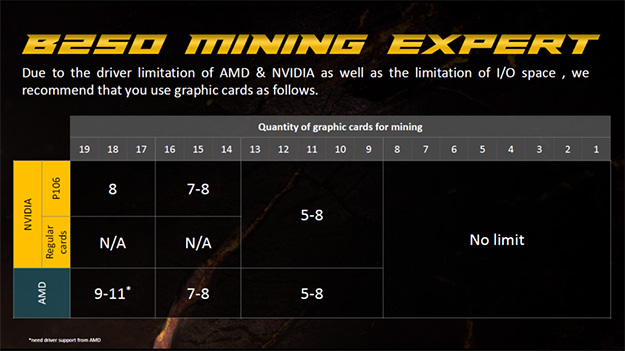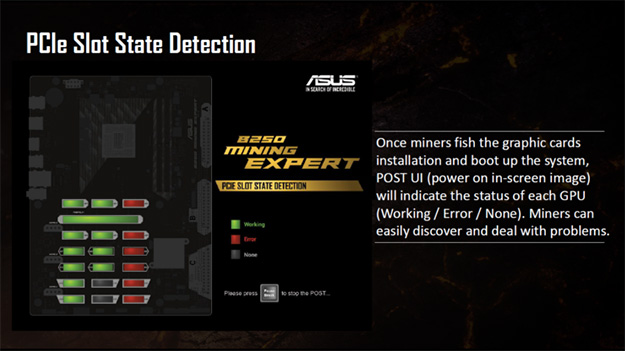ASUS is releasing a motherboard with 19 PCI-Express expansion slots, and no, it is not intended for gamers who want to play Crysis (or any other title). This one is aimed directly at digital coin miners as the cryptocurrency craze rages one. Like the California gold rush that lasted from 1848 to 1855, this cryptocurrency boom has modern day miners going out in search of riches, and more tools are being made available specifically for that purpose.

Cryptocurrency mining is red hot at the moment. Two of the most popular cryptocurrencies are Bitcoin and Ethereum, both of which are trading at obscenely high levels. At present, a single Bitcoin is worth $4,016 and a single Ether is worth $342.23. Ethereum is the newer of the two, though miners who sat on the sideline as Bitcoin ballooned in value hope that Ethereum will do the same. The other draw of Ethereum is that it can be mined using graphics cards rather than ASIC hardware, which has created a shortage of some popular cards for gaming.
The new B250 Mining Expert motherboard from ASUS is one of just a handful of motherboards designed specifically for mining, and the only one in the world to pack 19 expansion slots onto a single slab of electronics. All but one of those slots are PCIe Gen 3.0 x1 slots, while the remaining one is a PCIe 3.0 x16 slots. The short-term caveat is that GPU drivers from AMD and NVIDIA only support up to eight GPUs when running a multi-GPU setting, though AMD is prepping a driver release for later this year that will support up to 19 GPUs. We imagine NVIDIA will not be far behind.

ASUS divides the board’s 19 PCIe slots into three groups, each of which has its own dedicated 24-pin ATX12V power connector (these are located along the right edge of the motherboard). The above chart shows the recommended configuration for multiple graphics cards.

To help troubleshoot issues, ASUS has baked in a Post UI feature that provides users with a visual representation of their GPU setup with status indicators. Seeing green is good, as it indicates the card is working properly. Red means there is an error, while gray means the slot is not populated.
Beyond the crazy number of PCIe slots, this board features an LGA 1151 socket and is based on Intel’s B250 chipset. It supports Intel’s 6th and 7th generation Core processors (Skylake and Kaby Lake, respectively). It also supports up to 32GB of DDR4 memory in dual-channel mode and has four SATA 6Gbps ports for storage chores. External connectivity includes an assortment of USB 3.1/3.0 and USB 2.0 ports, along wit hHDMI output and a GbE LAN port.

As you might imagine, this board will come with a specially tuned BIOS for mining setups. Outside of digging for digital currency, there is little of interest here to general consumers, or even gamers.
Pricing and availability have not yet been announced.
Our Social Networks: Facebook Instagram Pinterest Reddit Telegram Twitter Youtube






